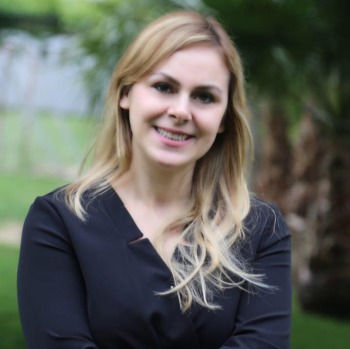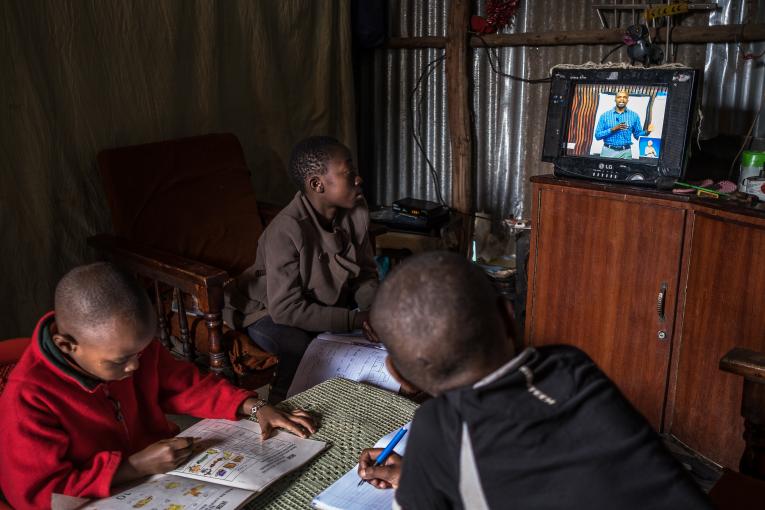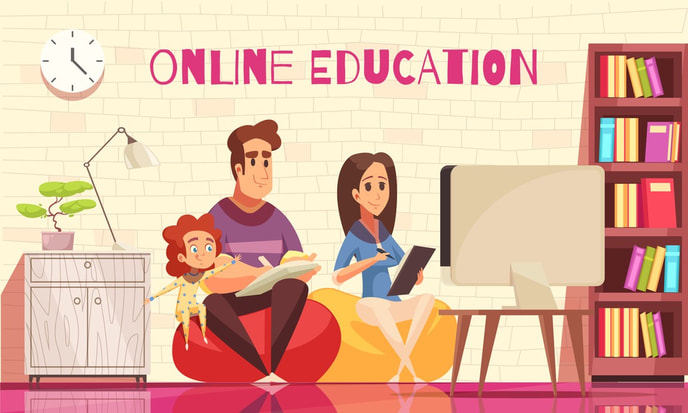|
COVID-19 salgınının tum dünyayı etkilediğinden beri, birçok ülkedeki eğitim sistemleri, aşağıdakiler de dahil olmak üzere uzaktan öğrenimi çocukları desteklemek için hızla dönüştürmüştür:
Fildişi Sahili, Kongo Demokratik Cumhuriyeti ve Nijerya da dahil olmak üzere Batı ve Orta Afrika'daki ülkelerde, hükümetler ilk ve daha düşük ortaöğretim çağındaki çocuklara çevrimiçi veya radyo, TV ve kağıt tabanlı yaklaşımlarla eğitim vermek için yerel hizmet sağlayıcılarla birlikte çalışmaktadır. Timor-Leste'de uzaktan eğitim programı "Eskola ba Uma" veya "Okul Eve Gidiyor" (“Eskola ba Uma” or “School Goes Home”) çocukların TV, radyo ve çevrimiçi platformlar aracılığıyla öğrenmeye devam etmesini sağlar. Bu seçeneklerden hiçbirine erişimi olmayanlar için UNICEF, kırsal bölgelerde Telenor ile ortaklık yaparak 600.000 cep telefonu kullanıcısına öğrenim materyallerine ücretsiz erişim hakkı verebilmiştir. Somali'de, çevrimdışı kayıtlı dersler güneş enerjili tabletlere yükleniyor ve çocukların kullanımına sunuluyor. Video dersleri ayrıca WhatsApp ve Facebook gibi sosyal medya kanalları üzerinden paylaşılır ve radyo ve TV üzerinden yayınlanır. Moğolistan'da, TV uzaktan eğitim için ana araç olmuştur. UNICEF, etnik azınlıklardan gelen çocuklara ulaşmak için Tuvan ve Kazak dillerinde okul öncesi ve ilköğretim için TV dersleri üretmek için hükümetle birlikte çalışmıştır. UNICEF ayrıca, uzak bölgelerde TV ve/veya internet erişimi sınırlı olan ilkokul çocuklarının öğrenimini desteklemek için çevrimdışı öğrenme materyalleri üretmek için yerel yönetimle birlikte çalışmıştır. Kırgızistan'da çocuklar çevrimiçi platformlar, üç ulusal TV kanalı ve iki mobil ağ uygulaması üzerinden uzaktan öğrenime ücretsiz olarak erişebilirler. UNICEF ayrıca, tüm uzaktan öğrenme derslerinin işaret dili aracılığıyla olanak sağlayarak, özel eğitim ihtiyacı olan çocuklar için içeriğin geliştirilmesini ve yayılmasını desteklemiştir. Özbekçe ve Tacik azınlık dillerinde de çocukların geride bırakılmamasını sağlamak için tüm derslerin altyazıları verilmektedir. Uruguay'da, Plan CEIBAL ve telekomünikasyon şirketi ANTEL arasındaki ortaklık, herhangi bir veri tüketimi olmadan tüm devlet öğrenme içeriğine erişim izni vermiştir. Jamaika'da, Milli Eğitim Bakanlığı ulusal kamu televizyonu, radyo, online platformlar ve WhatsApp üzerinden her düzeyde ders vermektedir. Devam eden eğitime kolaylaştırmak için bağlantı ve içerikle donatılmış tabletlere en savunmasız 210 öğrencinin erişimini düzenlemek için de çalışmalar devam etmektedir. Meksika'da, Hükümet stratejisi "Evde öğrenme" ulusal televizyon, radyo ve dijital kanallar aracılığıyla uzun mesafeli eğitim hizmetleri vermektedir. Yayın ulusal müfredata dayanmaktadır. Bangladeş'te, Hükümet, UNICEF ve Bilgiye Erişim (a2i), ilköğretim ve ortaöğretim düzeyindeki çocukların televizyonda kaydedilmiş dersler aracılığıyla derslere erişmelerini desteklemektedir. Viet Nam'da, bazı testler ve modüller müfredattan çıkarılırken, bazı konular ise öğrencilerin önceki yılın tamamında kaçırdıkları konuları öğrenmeleri hedeflenmiştir. Güncel program ise akademik baskıyı ve psiko-sosyal stresi azaltmalarına olanak sağlamak için bir sonraki öğretim yılına ertelenmiştir. ReferencesUNICEF. (2020, June 4). Unequal access to remote schooling amid COVID-19 threatens to deepen global learning crisis. https://www.unicef.org/press-releases/unequal-access-remote-schooling-amid-covid-19-threatens-deepen-global-learning
0 Comments
* Kaynakça göstererek paylaşabilirsiniz.You can share by showing the source. Preparing the Set-up
* Kaynakça göstererek paylaşabilirsiniz. Eğitimde teknoloji kullanımını konuşurken, uzaktan e-öğrenme kucağımıza düştü! Peki öğretmenler olarak neler yapmalıyız? Nelere dikkat etmeliyiz? Materyal hazırlamaktan, canlı yayın sırasında dikkat etmemiz gereken tüm ayrıntılar bu yazıda! Haydi başlayalım, Materyal Hazırlamak
Ortamı Düzenlemek
The "Design" and "Coding" workshop took place with the the partnership of the TurkishKit team on December 21-22, at TED Izmir College. Participants were from Izmir, Istanbul, Afyon, Ankara cities, and consisting of the university, high school, and middle school students. They met with Apple technologies and experienced Sketch, Swift, Xcode applications. This way, they also had the opportunity to develop important skills such as collaborative work, design thinking and problem solving. Before the workshop, we were very excited that we were going to partner with the TurkishKit team for the first time in an event. I had never had the opportunity to meet the members of the team before but we had a lot of common shares on phone and FaceTime conversations. It was a strong sign that we would do a good job even before we meet. Emirhan Erdogan, the founder of TurkishKit, was closely involved in all the details, from the selection of the event area to the location and logistics. Everyone cared that everything was beautiful and special. And that's what happened! "Design Day" Saturday, December 21, "Design Day" theme of the event that started with a pleasant introduction by Emirhan Erdoğan and breakfast "Meet WWDC" presentation excited the participants. At THE WWDC organized by Apple, the adventures from the application stage to the end of the event were inspired by the effective presentation of Sergen Gönenç and Can Demir, who were invited by Apple on a scholarship covering their travel and accommodation costs. The event continued with the presentation of "Design Oriented Thinking", participants discovered the solution-oriented mindset of being able to produce extraordinary, creative solutions to the problems experienced in everyday life and design. The presentation, presented by Sherpa/UX-UI Designer Orkun Duyar and Sherpa/UX Designer Serkan Dogan, opened new horizons for different looking and designing differently. Orkun Duyar and Serkan Doğan, who explained and applied "Draw Your Apple Watch App," "Basic Design and Sketch," "Design with Sketch," and "Instagram with Sketch", also developed participants' problem-solving, design development and collaborative working skills in event scenarios. “Coding Day” On Sunday, December 22nd, the second day with TurkishKit started with a wonderful breakfast that was organized by our school, TED İzmir College. The first session was about "Technology Has a Language: Coding". With the delightful narration of Can Demir -director of the TurkishKit blog-, participants discovered the perfect relationship between technology and code. They understood the importance of coding ideas, introduction to the Playground development environment, and writing code that others could understand. In the Swift Basics session, they experienced the concepts of "fixed and variable" by applying the function of a control mechanism in code and the "if-else" structure that controls states. The event, organized by TurkishKit content generator Sergen Gönenç, took the participants' coding skills to the next level. The perfect duo: In the Series & Loops session, they experienced how they can create sequences, and how repetitive loops work, holding multiple objects together. The session, which was held by TurkishKit content generator Berk Turan, was an important step for participants who wanted to improve the application. Designed on a design day, the Instagram posts, encoding in an interactive Playground environment, and the session where they can personalize their posts were performed by TurkishKit Instructor Rana Taki. After about three-and-a-half-hour long session, users designed their own Instagram posts. As TED Izmir College, we are proud to host this important study. The event taught participants about coding and design, while contributing to the development of his skills such as problem-solving, working as a team, sharing and being solution-oriented, which are all essential 21st-century skills. Thank you so much to the TurkishKit team and everyone who has supported it. Special thanks to Carlos Susin for the amazing pictures... |
FollowAuthor
Archives
October 2020
Categories
All
|




